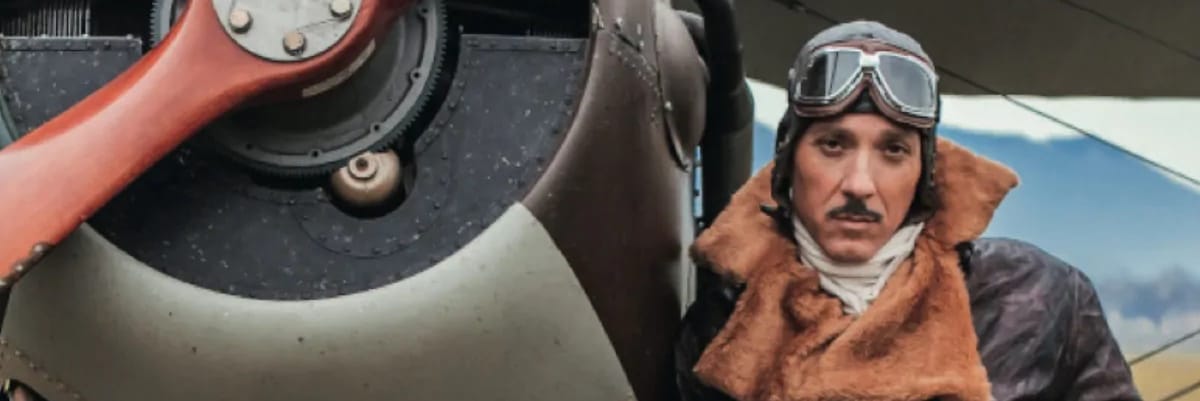The year 2023 is to see the release of as many as two Italian movies dedicated to as many gold medals for military valor: aviator Francesco Baracca, a World War I ace, and submariner Salvatore Bruno Todaro, who fell in 1942 among the X Mas raiders. Is this good news? A sign that Italy is starting to pay tribute to its heroes again, to celebrate patriotism and military virtues?
The government's role in productions
I am afraid, alas, this is not the case. But before we delve into the analysis, let us note that the two films are of close interest to us, as Italians, not only for moral reasons but also for material ones: indeed, both were made, at least in part, with taxpayers' money. I cacciatori del cielo, a tribute to Francesco Baracca, was co-produced by Luce Cinecittà (a public company) in collaboration with Rai Documentaries, Ministry of Defense, Air Force, Difesa Servizi. Comandante, dedicated to Salvatore Todaro, was produced together with Rai Cinema in collaboration with the Navy, Luce Cinecittà, Fincantieri (majority shareholder is Cassa Depositi e Prestiti). The latter also received contributions from the Ministry of Culture (including tax credit, reinvestment automatic and selective contributions, amounting to almost 3 million euros), the Campania Region and the Apulia Region.
It is worth noting that, at the time the grants were awarded, all of the public bodies and entities mentioned above were dependent (directly or indirectly) on leftist administrations.
Todaro: from submarine to squat
Comandante is still in production; it will be released later this year. However, we do know that Todaro's life will not deal with the daring raids on Sevastopol and Bona, but with a very specific episode: the sinking of the Belgian merchant ship Kabalo, on which Todaro undertook to bring shipwrecked people to safety, even at the cost of exposing his submarine and his men to grave risks. Producers' press releases are very clear in emphasizing the choice to contravene commands in order to save castaways by "taking them to the nearest safe harbor, as required by the law of the sea." In short: Todaro would be a Carola Rackete ante litteram.
The exploitation of the story from an immigrationist perspective is evident. One does not even need to wait to be able to see the movie. Edoardo De Angelis, director and author of the film, is a well-known apologist for NGOs. For him, Giorgia Meloni is a "mythomaniac with absurd ideas," Matteo Salvini a “gall ncopp a munnezz” (someone cocky, to put it euphemistically). Signing with him on the film is writer Sandro Veronesi, who, in order to defend the immigrationist NGOs, went so far as to curse the two leaders of the Italian Right. The lead actor, Pierfrancesco Favino, at the 2018 Sanremo Festival was invited on stage to deliver a monologue in favor of illegal immigrants.
I cacciatori del cielo: neither flesh nor fowl
Let's turn to I cacciatori del cielo. In this case, the role of the Armed Forces is prominent. The film was expressly made to celebrate the centenary of the Air Force. It was broadcast by RAI in recent days and, therefore, it is already possible to give a final judgment of it. We will start from the technical and formal aspect and then move on to the content and the "message."
I cacciatori del cielo presents itself as a hybrid product. It is a juxtaposition of acted scenes, archival footage, parts narrated by the film's protagonists as in an interview, even cartoon segments. Let's say right away that the result is not exciting. The movie ends up being neither flesh nor fowl.
Is it conceivable to make a film about an ace aviator in which one does not even see aerial combat? According to those who made I cacciatori del cielo, yes. Only a couple of them are depicted, via short, crude cartoon segments. Was the choice motivated by a desire not to appear too "martial" (mindful of the time when the Five Star Movement-ruled Prime Minister's Office censored an Armed Forces Day ad because it had too many combat scenes) or by a mere lack of funds?
More should be invested in war films
In the second and more likely scenario - the shortage of money - one cannot help but notice that since the Air Force alone has a multi-billion dollar budget and RAI collects almost 2 billion annually from the TV license fee, if the will were there the money could be found for a production that, even from the point of view of special effects and entertainment, would be competitive with the best international films (Top Gun: Maverick, one of the most recent and ambitious war movies, cost $170 million - only to pay for itself handsomely at the box office, where it grossed $1.5 billion).
The importance of film productions should not be underestimated. The Armed Forces vitally need a favorable environment to operate at their best: if the people lack patriotism, awareness of the national interest and the fundamental role played by the military, the military will find itself without funds, without recruits, and without political support for its missions. Investing in a movie of national, if not international, significance would not be a waste of money, but a magnificent operation of national education.
If there wasn't the will or ability to make a film up to the mark, other paths could be considered. I cacciatori del cielo could have been produced as a docu-film, focusing it on historical recollection, replacing the actors' acted "interviews" with those of experts in the field, reducing the acting to scripted intervals -which at that point would not have disfigured. Or, in a bolder move, they could have gone for a purely animated product. It is 2023, and animated movies for adult audiences are now fully cleared through customs (think only of Japanese anime ) - particularly for young adults who, along with teenagers, should be the main target audience for Armed Forces communication.
Stop watering down patriotism
One cannot avoid a comment regarding the choice of the lead actor. Beppe Fiorello is undoubtedly a good actor, but he is 54 years old, which is visible to everyone. In the movie he impersonates a character who, at the time of the depicted events, was between 27 and 30 years old. The half. The incongruity is not only aesthetic, but at least in one scene it seems to influence even the screenplay: it is the one in which, talking to his lover Norina Cristofoli, Baracca/Fiorello shows himself skeptical about the possibility of building a family with her not only because of their age difference (Cristofoli was 14 years younger, she was just 16 when they met), but because he himself would consider himself too old a father: "Children must have young fathers." A phrase that sounds out of tune in the mouth of someone not even 30 years old. All this begs the question: why picking Fiorello of all people to impersonate Baracca, at the cost of being unnatural and anachronistic? Hopefully, the motivation does not lie in the politically "correct" views of the actor, apologist and aspiring interpreter of far left and immigrationist mayor Mimmo Lucano: a toll paid to avoid accusations of "militarism."
Accusations that, in any case, would have had little grounds on which to stand. We see this discussing the most important thing: content. At least from this movie, an expression of the Air Force, we would have expected a clear message of patriotism and celebration of the heroism of our warfighting ancestors. Of that, indeed, there is very little. Much less of the references to the alleged injustice of war - our Fourth War of Independence. The hero's mother, Paolina Biancoli, is depicted almost as a pacifist. Yet, it was she who supported her son's choice to pursue a military career, despite his father's opposition. When the war broke out, the noblewoman - though worried and frightened - encouraged Francesco Baracca to honor himself.
In general, the depiction of war is merely tragic. Its protagonists appear fearful, haunted by the danger of death. They had good reason to be, yet this contrasts with what we read in the many war diaries of officers and volunteers: the patriotic exaltation, the courage, the ability to exorcise the specter of death by trying to think about it as little as possible.
The core message of I cacciatori del cielo, ultimately, lies in the scene in which Baracca, objecting to the order to strafe the enemy trenches (we will not go into the merits of this type of mission, which is extremely dangerous but common in all the air forces engaged in the conflict), voiced his desire for an air force independent of the Army. The Air Force is certainly right to proudly claim its independence, but a hundred years later, and with that independence not being questioned in the slightest today, perhaps the film's message could have been more ambitious and "ecumenical."
Waiting for a true Italian war movie
All in all: we welcome the military decision to engage in a cinematographic effort such as I cacciatori del cielo. On the quality of the outcome of such efforts, I have many doubts. Such constructive criticism, however, is not meant to dissuade us from pursuing this path, far from it: the military should invest even more in such initiatives. With the hope that, in the new political climate, they can do so without having to come to terms with the pacifism and creeping anti-militarism of the Left.
Founder and President of Centro Studi Machiavelli. Graduated in Historical Sciences (University of Milan) and PhD in Political Studies (Sapienza University), he is professor of "History and doctrine of jihadism" and "Geopolitics of the Middle East" at Cusano University. From 2018 to 2019 he was Special Advisor on Immigration and Terrorism to the Undersecretary of Foreign Affairs Guglielmo Picchi. His latest book (as editor) is Topicality of sovereignism. Between pandemic and war.









Anni ’50, altri tempi, preistoria, dove il film della Folgore ad El Alamein era supervisionato dalla Med. Oro al V:M: Col PALUMBO …
Quante fesserie in così poco spazio.
Sulla ridicola critica ex ante a “Comandante” nemmeno mi esprimo, chi ha realmente letto le interviste rilasciate da De Angelis (e magari anche il romanzo che ha scritto con Veronesi) sa bene che gli autori del film, che hanno avuto accesso alle lettere personali dell’Eroe fornite dalla famiglia, hanno pienamente compreso, e mostrano sia nel libro che nel film, che Todaro era un combattente, uno che ci credeva e che non si tirava indietro. Ma lei chiaramente non ha letto niente più che qualche articoletto pubblicato da “La verità” o qualche altro pseudogiornale di partito. Se non avesse appreso dell’esistenza di Salvatore Todaro l’altro ieri da questi giornali, saprebbe che da sempre il salvataggio dei naufraghi del Kabalo, una delle azioni più luminose ed eroicamente pure di quella guerra (che Todaro replicò quando affondò un altro piroscafo, il britannico Shakespeare, qualche tempo dopo), è il gesto per cui è giustamente famoso, ergo ben ovvio che un film su di lui si soffermi soprattutto su questo episodio. Episodio in cui, del resto, si assiste ad un suo successo, l’affondamento appunto di una nave nemica. Successi che mancarono nelle pur valorose azioni di Sebastopoli e Bona (saprebbe lei parlarmene nel dettaglio? Ne dubito), non per colpa sua. Una volta dicevano che i trinariciuti, che ripetevano a pappagallo il copione stilato dal partito, erano i comunisti…
Quanto alle pappardelle sul pacifismo/antimilitarismo immaginario, la invito a leggere meno diari di ufficiali e volontari (pochissimi, questi ultimi, nel Regio Esercito nel primo conflitto mondiale) e qualche diario in più degli innumerevoli poveri cristi che furono trascinati controvoglia nell’inutile strage che fu la Grande Guerra, ben pochi dei quali, purtroppo, hanno lasciato qualcosa più che una memoria orale. Gliene suggerisco un paio: “Vita di guerra e di prigionia” di Pietro Ferrari e “Diario di un imboscato” (che imboscato in realtà non era, anzi fu pure decorato, pensi lei…) di Attilio Frescura (quest’ultimo era pure ufficiale, ma a differenza di tanti altri preferì dire le cose come stavano anche nel clima grottescamente retorico del primo dopoguerra, dove su tante schifezze si sorvolò per carità di patria – e si sorvola ancor oggi – perché almeno quella guerra l’avevamo “vinta”…)
Non dubito che il valoroso autore di questo articolo si guarderà bene dal pubblicare questo mio commento, ma almeno se lo leggerà a sua personale ignominia. Con questo le auguro una buona serata.
Pubblichiamo tutti i commenti (a parte quelli di spam od oscenità) e non c’era motivo di fare eccezione col suo. Il quale altro non fa che perseverare nella medesima retorica anti-nazionale che l’articolo critica. E’ esattamente contro persone come lei che l’ho scritto; perciò la rabbia scomposta che traspare da questo commento mi rende giustizia sul buon lavoro fatto: devo avervi colpito un nervo scoperto. (Daniele Scalea)
Oh, la proiezione è certamente un fenomeno psicologico interessante, così come è eloquente il fatto che abbia evitato di rispondere nel merito.